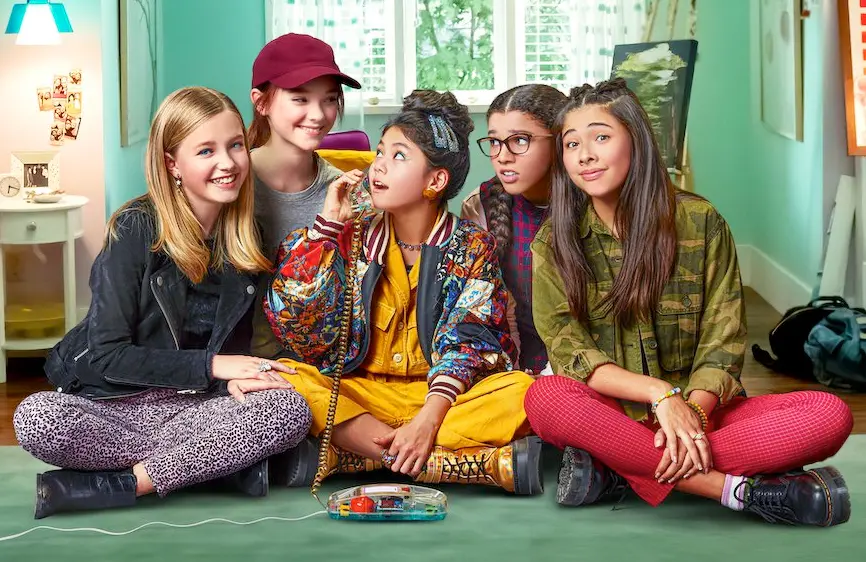Netflix's Baby-Sitters Club Series Does a Beloved YA Adaptation Very Right
-
 The Baby-Sitters Club (Netflix)
The Baby-Sitters Club (Netflix)In a day and age where if you wait long enough, any pre-existing property will eventually get snatched up by a TV platform or movie studio and either adapted, rebooted, or revised for modern consumption, it should come as no surprise that there is a new TV series adaptation of The Baby-Sitters Club. The young-adult series of novels by Ann M. Martin were published from 1986-1999 and captivated a generation of young people with the stories of a group of Connecticut middle-school friends who weren't solving mysteries or facing down a fascist regime in a dystopian future, but instead created a business where they could provide their community with a deeply needed service: top-notch babysitting. Netflix's adaptation, via writer/producer Rachel Shukert, brings the Baby-Sitters Club into 2020 with a confidence that doesn't screamingly announce itself as an edgy re-imagination, but instead harnesses the books' most enduring appeal: its relatably humane and forthright characters.
For fans of the novels — and full disclosure: here's where I say that I devoured these books as a kid and feel a tremendous nostalgic pull and protective loyalty to the characters therein — it should be a comfort to know just how much about The Baby-Sitters Club remains the same. The first eight episodes of the ten-episode season are the first eight titles of the books, with the others being a two-part summer-camp adventure that lines up with the second "super special" crossover event. Like the books, each episode is narrated by a different member of the club: headstrong Kristy (Sophie Grace), mousy Mary Ann (Maila Baker), artsy Claudia (Momona Tanada), sophisticated NYC transplant Stacy (Shay Rudolph), and — in the show's biggest update of the main cast — progressive-minded Dawn (Xochitl Gomez). For the most part, their characters have remained consistent from the books, and it's rather remarkable how little of the club's origin story has changed in its three-decade-plus journey to the present day. We talk so much about how unrecognizable our childhoods are without smartphones or ride-shares or Wikipedia, but the show just calmly updates where needed (the Club's schedule is kept on a Google doc now) and doesn't twist itself into knots when certain old-school totems need to be kept (Claudia acquires the Club's landline phone on Etsy).
The Club's origin story remains the same: Kristy has a great idea to start a babysitting service with her best friends, in part to help service a community desperate for reliable, dedicated sitters for their kids, in part to make a little money, but mostly because kids that age want to find any reason they can to hang out with their friends. Martin's girls were tweens before marketing firms knew what to do with that demographic, and Shukert does a fantastic job keeping them pure of intention even as their circumstances feel decidedly more modern. What's best about The Baby-Sitters Club, then and now, is that their stories are so human-sized, without being depicted as either simple or idyllic. Kristy's mom (Alicia Silverstone!) is dating a dweeby but ultimately good-hearted man (Mark Fuerstein) who Kristy hates for very seventh-grade reasons. Mary Ann's single dad (Marc Evan Jackson) is overprotective. Stacy's worried her new friends won't handle her health diagnosis any better than her NYC friends did. Claudia doesn't get along with her brainy older sister, which is exacerbated when her beloved grandmother has a stroke. And at the age of twelve, they're starting to get an eye for boys, a recurring complication that's dealt with sweetly and with relatable awkwardness.
Shukert and her team of writers resist any temptation to raise the stakes higher than they need to be, and in doing so manages to still draw real-world parallels that actually land, like when Mary Ann starts babysitting for young Bailey, whose new wardrobe of princess gowns clues Mary in to the fact that she's trans. It's a story told sensitively and directly, without ever feeling effortful or even all that edgy. The same is true when Claudia learns that her grandmother was placed in a WWII internment camp for Japanese-Americans, a revelation that doesn't need any loud trumpets to resonate with current events. Nothing ever feels Very Special about these moments, but what they do is underline the central qualities of responsibility and care that these girls have always had, making them a perfect fit for the kids of today. And while tween audiences in 2020 may not feel the nostalgic pull to the BSC that some of us olds do, that kind of sensibility may well prove to be timeless.
The Babysitters Club drops on Netflix on Friday, July 3rd.
People are talking about The Baby-Sitters Club in our forums. Join the conversation.
Joe Reid is the senior writer at Primetimer and co-host of the This Had Oscar Buzz podcast. His work has appeared in Decider, NPR, HuffPost, The Atlantic, Slate, Polygon, Vanity Fair, Vulture, The A.V. Club and more.
TOPICS: The Baby-Sitters Club, Netflix, Alicia Silverstone, Marc Evan Jackson, Mark Fuerstein